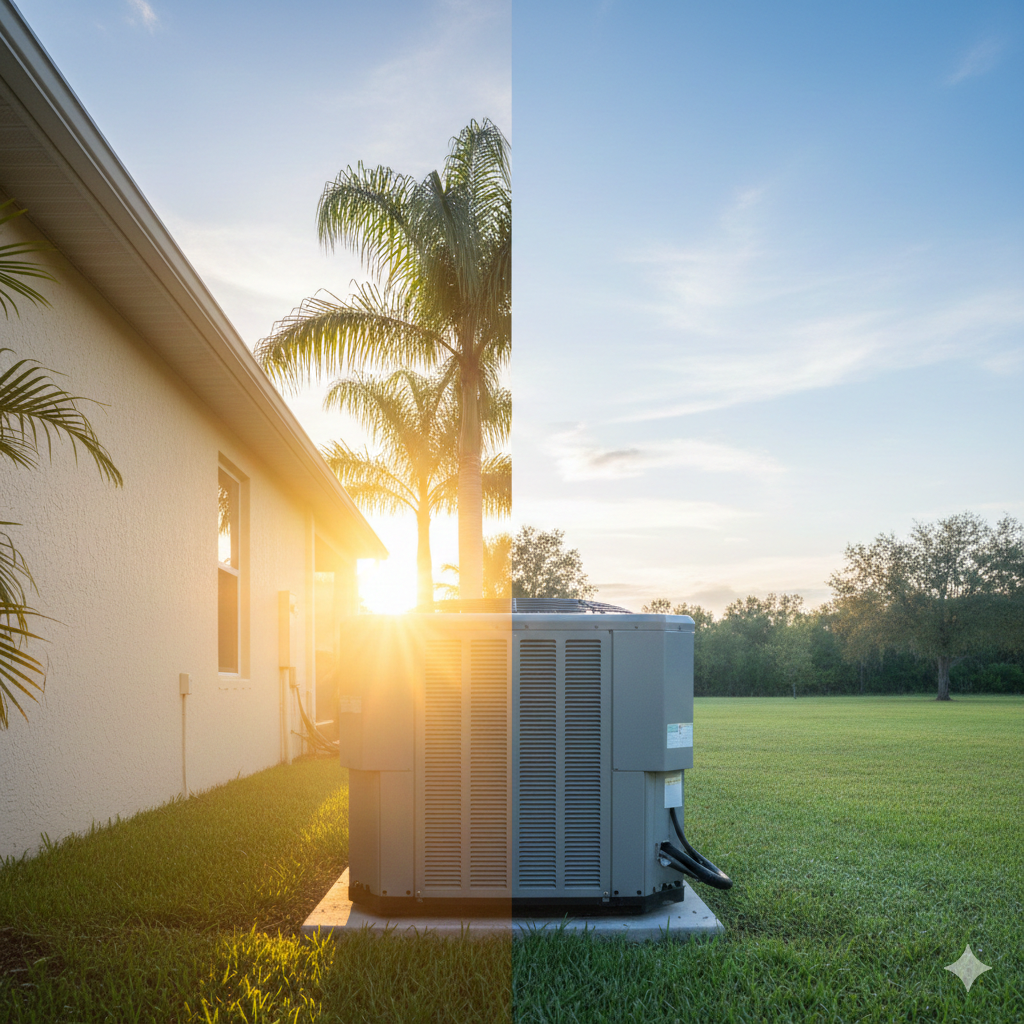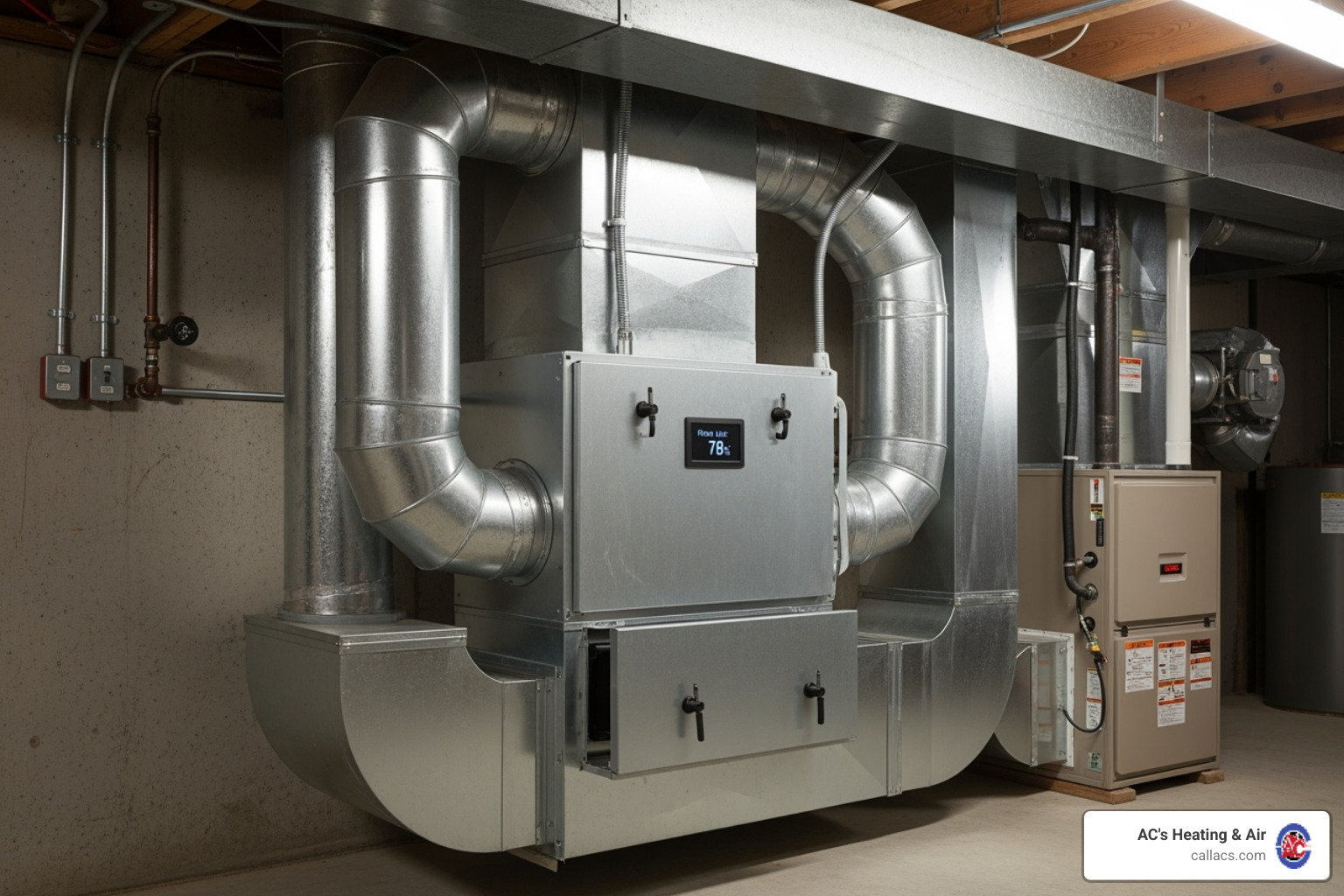The Chilling Truth: Why Your Air Conditioner Freezes Up and How to Solve It

Why Your AC Freezes Up and How to Thaw It
If your air conditioner is freezing up during the peak of summer heat, you’re not alone. This common problem can lead to HVAC system breakdowns if ignored. But why does this happen, especially when you need your AC the most?
Here’s a quick rundown of why air conditioner freezing up occurs:
- Low Refrigerant Levels: Not enough refrigerant can lead to freezing coils.
- Dirty Air Filters or Blocked Vents: These restrict airflow, causing the system to freeze.
- Damaged or Faulty Wiring: Electrical issues can disrupt the unit’s operation.
- Clogged Condensate Drain Line: Blocks condensation removal, leading to ice buildup.
I'm Allen Chenault, owner of AC's Heating & Air. With over 8 years of experience tackling air conditioner freezing up issues, I've seen how proper maintenance can prevent these troubles.
Now, let’s dive into why this happens and how you can prevent it to keep your home cool and comfortable all summer long.

Understanding How Your Air Conditioner Works
To understand why your air conditioner freezes up, we first need to look at how it works. At the heart of your AC system is a fascinating principle of thermodynamics called the Joule-Thomson effect. This principle explains how temperature changes when a gas expands or is compressed. Here's a simple breakdown of the key components and processes involved:
The Joule-Thomson Effect
In your air conditioner, refrigerant—a special chemical—is used to absorb and release heat. When the refrigerant expands, its temperature drops. When it's compressed, its temperature rises. This is the Joule-Thomson effect in action.
The Role of Refrigerant
Refrigerant is crucial for cooling your home. It flows through the system, absorbing heat from inside your house and releasing it outside. The refrigerant is cycled through two main components: the evaporator coil and the condenser coil.
Evaporator Coil
The evaporator coil is located inside your home. This is where the refrigerant absorbs heat from the indoor air. Warm air from your home passes over the cold evaporator coils, cooling down as the refrigerant absorbs the heat. This cooled air is then circulated back into your home.
Thermodynamics in Action
In simple terms, thermodynamics is the study of how heat moves. Your air conditioner uses these principles to transfer heat from inside your home to the outside. The refrigerant plays a key role in this heat exchange process. If something disrupts this process—like a refrigerant leak or blocked airflow—the system can become unbalanced, leading to freezing issues.
Understanding these basics helps you see why maintaining your AC system is so important. Regular checks and proper maintenance can keep your air conditioner running smoothly and prevent those annoying freeze-ups.
Common Causes of Air Conditioner Freezing Up
One of the most common reasons for an air conditioner freezing up is blocked air flow. When air can't move freely through the system, the evaporator coils can get too cold and freeze. This can happen due to:
- Dirty filters: Air filters trap dust and debris. Over time, they can get clogged, restricting airflow. It's essential to replace these filters regularly.
- Clogged ducts: Dust, pet hair, and other debris can accumulate in your ducts, blocking airflow. This is why professional duct cleaning is crucial.
- Blocked vents: Furniture or curtains can block supply and return vents, disrupting airflow. Always ensure vents are clear.
Low Refrigerant Levels
Refrigerant is the lifeblood of your AC system. If the levels are too low, it can cause the evaporator coils to freeze. This usually happens due to:
- Refrigerant leaks: Small holes or cracks in the refrigerant lines can cause leaks. This not only reduces cooling efficiency but also leads to freezing.
- Low refrigerant: When refrigerant levels drop, the pressure in the system decreases, causing the coils to get too cold.
If you suspect a refrigerant issue, it's best to call an HVAC professional for refrigerant replacement and system inspection.
Dirty Air Filters or Blocked Vents
A dirty air filter can severely restrict airflow, causing your AC to freeze. Similarly, blocked vents can disrupt the balance of air circulation. Here's what you can do:
- Air filter replacement: Check your filter every month and replace it if it's dirty. This simple step can prevent many issues.
- Vent cleaning: Ensure that all supply and return vents are clean and unobstructed. Regularly vacuum and dust around these areas.
Mechanical Problems or Refrigerant Leaks
Mechanical failures can also cause your air conditioner to freeze. Common issues include:
- Compressor or fan problems: If the compressor or fans aren't working correctly, the system can't remove heat effectively, leading to freezing.
- Refrigerant lines: Kinks or damage in the refrigerant lines can disrupt the flow, causing low pressure and freezing.
Regular tune-ups by an HVAC professional can catch these issues early. They can inspect and repair any mechanical problems, ensuring your system runs smoothly.
Cool Summer Nights
Believe it or not, cool summer nights can cause your AC to freeze. Air conditioners are designed to operate within specific temperature ranges. When the outside temperature drops below 60°F, it can throw your system off balance.
- Programmable thermostat: A programmable thermostat can automatically adjust settings to prevent freezing during cool nights.
- Temperature thresholds: Set your thermostat to avoid running the AC when the temperature drops too low. This simple calibration can save you from freeze-ups.
How to Fix a Frozen Air Conditioner
Thawing Your AC Unit
When your air conditioner freezes up, the first step is to turn off the thermostat to stop the system from trying to cool. This prevents further damage.
Next, turn on the fan. This helps circulate air and speeds up the defrosting process. Let the fan run for about 2-3 hours. Be ready with towels or pans, as thawing will produce water.
Safety Tip: Never use high-temperature methods like a heat gun or boiling water to thaw the unit. These can damage your system.
Cleaning and Maintenance
Once your AC has thawed, it's time for some cleaning and maintenance to prevent future freeze-ups.
- Replace the Air Filter: Even if the filter looks clean, replace it. A dirty filter restricts airflow, which can cause freezing.
- Inspect the Drain Line: A clogged condensate drain line can cause water to back up and freeze. Check the line and clear any blockages.
- Ensure Fan Functionality: Make sure the fan is working properly. If the fan is not moving, air can't circulate over the evaporator coils, leading to freezing.
- Regular Maintenance: Schedule regular maintenance to keep your system in top shape. This includes cleaning coils, checking refrigerant levels, and inspecting ducts.
Professional Help
Sometimes, DIY steps aren't enough. If your air conditioner continues to freeze up, it might be time to call in a professional.
- HVAC Technician: A trained technician can handle refrigerant safely and check for mechanical issues. They can also perform more in-depth maintenance tasks.
- Refrigerant Handling: Low refrigerant levels can cause your AC to freeze. A professional can check for leaks and recharge the refrigerant.
- Mechanical Repairs: If there are broken parts or other mechanical issues, a technician can repair or replace them to get your system running smoothly again.
- Professional Tune-Ups: Regular tune-ups by a professional can catch small issues before they become big problems. This helps keep your AC running efficiently and prevents freeze-ups.
Preventative Measures to Avoid AC Freezing
To keep your air conditioner from freezing up, it's crucial to take some preventative measures. Here are the key steps you can follow:
Regular Maintenance
Routine maintenance is essential for keeping your AC in top shape. This can save you from expensive repairs down the road and extend the life of your unit.
- HVAC Tune-Ups: Schedule regular tune-ups with a professional. These check-ups can catch small issues before they become big problems.
- Cleaning Coils: Dirty coils can reduce efficiency and cause your system to overheat. Clean both the evaporator and condenser coils annually.
- Checking Refrigerant Levels: Low refrigerant levels can lead to poor cooling and increased energy consumption. Have a professional check and refill it if necessary.
- Inspecting Ducts: Ensure that your ducts are clean and free of leaks. Blocked or leaking ducts can waste a lot of energy.
Air Filter Replacement
Changing your air filters regularly is one of the simplest yet most effective ways to prevent your air conditioner from freezing up.
- Changing Air Filters: Replace your filters every 1-3 months. This improves airflow and prevents clogs.
- Improving Airflow: Clean filters mean better airflow, which helps your system run more efficiently.
- Preventing Clogs: Dirty filters can restrict airflow, causing your AC to freeze. Regular replacement keeps this from happening.
- Energy Efficiency: Clean filters help your system run more efficiently, saving you money on energy bills.
Programmable Thermostat
A programmable thermostat can be a game-changer for preventing AC freeze-ups.
- Temperature Control: A programmable thermostat helps you control the temperature more effectively.
- Automatic Shut-Off: It can automatically shut off the AC when temperatures drop below a certain level, preventing freeze-ups.
- Energy Savings: By optimizing your AC usage, a programmable thermostat can help you save on energy costs.
Professional Inspections
Regular professional inspections can help you catch problems early and keep your system running smoothly.
- Annual Inspections: Have a technician inspect your system at least once a year. They will check the thermostat, tighten electrical connections, and clean important components.
- Early Problem Detection: Technicians can spot and fix small issues before they become big problems. This includes checking refrigerant levels and inspecting the gas pressure.
- Maintenance Plans: Consider signing up for a maintenance plan with a trusted HVAC service provider. This can ensure regular check-ups and timely repairs.
By following these preventative measures, you can keep your air conditioner from freezing up and ensure it runs efficiently all summer long.

Next, we'll answer some frequently asked questions about air conditioner freezing up and how to address them effectively.
Frequently Asked Questions about Air Conditioner Freezing Up
How do I stop my air conditioner from freezing up?
Preventing your air conditioner from freezing up involves a few key steps:
- Check Refrigerant Levels: Low refrigerant levels can cause the evaporator coils to get too cold, leading to freezing. If you suspect low refrigerant, contact a professional HVAC technician to check and refill the refrigerant.
- Replace Air Filters Regularly: Dirty air filters restrict airflow, causing the coils to freeze. Change your air filters every 1-3 months depending on usage and household conditions.
- Inspect the Drain Line: A clogged condensate drain line can cause water to back up and freeze on the coils. Regularly inspect and clean the drain line to ensure proper drainage.
- Ensure Fan Functionality: The blower fan must be working correctly to maintain airflow over the coils. Check for any issues with the fan and have them repaired if necessary.
By maintaining these components, you can significantly reduce the chances of your air conditioner freezing up.
How do you unfreeze an AC unit?
If your air conditioner has already frozen up, follow these steps to unfreeze it:
- Turn Off the Thermostat: Switch off the cooling function on your thermostat to stop the AC from running.
- Turn On the Fan: Set your thermostat to fan mode. This will help circulate air and melt the ice on the coils.
- Allow Thawing Time: Let the fan run for several hours. Be prepared for water to drip as the ice melts, so have towels or a pan ready to catch the water.
- Inspect and Clean: Once thawed, check and replace the air filter, clean the evaporator coils if accessible, and ensure the drain line is clear.
These steps should help you defrost your AC unit and get it back to normal operation.
Does low Freon cause freeze up?
Yes, low Freon (refrigerant) levels can cause your air conditioner to freeze up. Here's why:
- Cold Coils: Refrigerant is essential for the cooling process. When levels are low, the pressure drops, causing the coils to become too cold and eventually freeze.
- HVAC Service: If you suspect a refrigerant leak or low levels, it's crucial to contact an HVAC professional. Handling refrigerant requires special training and equipment.
- Refrigerant Replacement: A technician will check for leaks, repair them if necessary, and refill the refrigerant to the correct levels, preventing future freeze-ups.
Maintaining proper refrigerant levels is vital for the efficient and smooth operation of your air conditioner. Regular check-ups by a professional can help ensure your system stays in top shape.
Conclusion
Keeping your air conditioner from freezing up is all about regular maintenance and timely professional help. At AC's Heating & Air, we understand the frustrations of dealing with a frozen AC unit, especially during the sweltering summer months.
Regular maintenance is key to preventing your air conditioner from freezing. This includes changing air filters, cleaning coils, and checking refrigerant levels. Regular HVAC tune-ups can catch small issues before they turn into major problems.
Here are a few simple steps you can take:
- Change air filters regularly to ensure proper airflow.
- Inspect and clean the drain line to prevent blockages.
- Keep an eye on your refrigerant levels and ensure there are no leaks.
Despite your best efforts, sometimes professional help is necessary. Our team of experienced technicians at AC's Heating & Air is ready to assist you. We can handle everything from routine maintenance to complex repairs, ensuring your air conditioner runs smoothly all summer long.
By scheduling regular professional inspections, you can catch potential problems early. This proactive approach not only prevents freeze-ups but also extends the lifespan of your HVAC system.
Don't wait for your air conditioner to freeze up again. Take action now to keep it running efficiently. For reliable and friendly service, contact AC's Heating & Air today and schedule your appointment.
A well-maintained AC unit is the best defense against the heat. Let's keep your home cool and comfortable, no matter how high the temperature rises.
By following these tips and relying on the expertise of AC's Heating & Air, you can avoid the headache of a frozen air conditioner and enjoy a cool, comfortable home all summer long.



